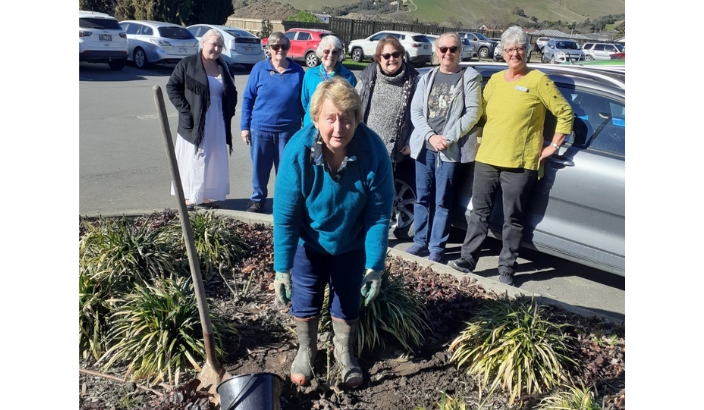Celebrating 100 Years of Rural Women NZ: Marlborough’s Legacy of Strengthening Rural Communities


Rose planting at Marlborough Hospice: Ellen Orchard, Gillian Neal, Helen Campbell, Bev Black, Glenda Robb, and Hospice ladies. Photo: Supplied.
This year marks a remarkable milestone for Rural Women New Zealand (RWNZ) as they celebrate a century of dedication to improving rural lives and communities across the country.
ADRIENNE MATTHEWS
In Marlborough, five active branches – Kenepuru, Pelorus Sounds, Rai Valley, Blenheim/Wairau, and Mahakipawa – unite under the Marlborough Provincial Rural Women banner, led by President Ellen Orchard of the Kenepuru branch. With Vice Presidents Bev Black and Glenda Robb, and Secretary/Treasurer Melva Robb, the Provincial’s leadership is steeped in commitment and experience, continuing to ensure that rural women, their families, and their communities are supported through all kinds of changes and challenges.

RWNZ got its start in July 1925, when sixteen women came together looking for friendship, support, and a way to improve life for women living in rural areas. It was originally known as the Women’s Division of the Farmers’ Union (WDFU). At a time when rural women were often isolated, with few services or outlets beyond the home, the organisation provided vital community, purpose, and voice.
One of Marlborough’s most inspiring pioneers was Nellie Schroder MBE of Rai Valley, who was foundational in establishing the Marlborough branch. She became its first President and later rose through the national ranks to Dominion President in 1954, before becoming an International Officer, then Vice President for South Pacific area ACWW. She championed health, education, and wellbeing for rural women and children. From the Correspondence School advocacy to fighting for rural postal services and doctors, her influence was profound.
Throughout the decades, the Marlborough branches have never shied away from challenges. Whether it’s pushing for a reduced speed limit around school buses or lobbying for lights on rural buses, they have continuously placed community safety front and centre. “The health and welfare of rural families remain a priority,” explains Glenda Robb.
One major past project was Stockport House, a youth hostel run by the organisation from 1977 until it closed and its proceeds donated to the then-forming Marlborough Hospice. Stockport House provided a home-like stepping stone for young rural people coming to town for work. “It was a unique model,” Glenda explains. “They had supervision, home-cooked meals and it really helped ease the transition.”
“We’ve always knitted for babies,” adds her sister Melva. “Hospitals increasingly request woollens because synthetic baby clothing can be too hot or too cold while wool helps regulate infants’ temperatures better. They also request pyjamas for children going into hospital.”
More recently, Rural Women’s role in disaster response has expanded dramatically, working alongside Marlborough Federated Farmers and the Top of the South Rural Support Trust. From the Christchurch and Kaikoura earthquakes to floods, droughts and fires in the top of the South, the organisation has packed and dispatched hundreds of boxes of household goods, clothes, food, blankets, and more.
“After the Kaikoura earthquake, many families had no intact cups or plates, so we sent boxes of dinner sets and food wherever they were needed.”
These responses are not only acts of charity, but they are also acts of connection and compassion and a conversation starter for those in stress.”

Marlborough’s branches have supported Life Education, fundraising for a mobile van to visit schools, and continued their awareness campaigns, most recently to educate about Leptospirosis, a bacterial disease passed from animals to humans that can become life threatening “It’s not just farmers at risk anymore,” says Glenda. “Our latest roadshows have been about raising awareness and teaching people how to protect themselves
While Rural Women NZ is deeply local, it is also globally connected through Associated Country Women of the World (ACWW), an international body working to support women in poorer nations with access to clean water, sanitation, and education.
To mark the Centennial year, Rural Women have had a new rose bred in their honour, ‘Rural Women.’ Bred by award-winning rose breeder Bob Matthews of Matthews Nurseries Ltd., the magnificent pink/mauve fragrant floribunda has captured hearts with thousands sold around the country. Now sold out, it is hoped that there will be more available next year. Recently, one was planted at the Marlborough Hospice, and another is destined for Pollard Park as a lasting tribute to the group’s enduring legacy.

Despite so many achievements, challenges remain. “Our numbers are down to about 50–60 active members across Marlborough,” admits Melva. “Some are now individual members and not part of branches, which changes how involved they are. You don’t actually have to be a farmer or live rurally to join. We welcome people from town too,” she emphasises. “We would love to have more members.”
Rural Women Marlborough doesn’t chase headlines, but it shows up when help is needed. For 100 years, it has offered an unwavering hand of support. The Centennial is an opportunity to recognise what happens when women unite, roll up their sleeves, and quietly, effectively get things done.
